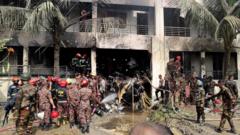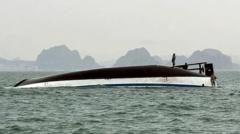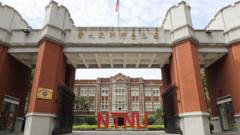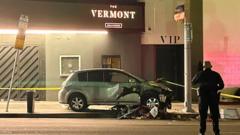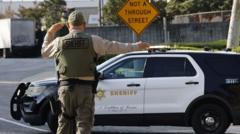A report attributing the deadly Jeju Air Flight 2216 crash to pilot error is met with backlash from victims' families, who argue for a more thorough investigation that considers additional factors such as the airport’s concrete barriers.
Families Challenge Findings on Jeju Air Crash, Call for Broader Investigation

Families Challenge Findings on Jeju Air Crash, Call for Broader Investigation
Victims' families reject pilot error narrative in devastating Jeju Air crash, demanding accountability for all contributing factors.
Families mourning the victims of South Korea's most tragic air disaster are expressing their outrage over a report attributing the crash of Jeju Air Flight 2216 to pilot error. According to local media reports, investigators concluded that the pilot mistakenly shut down the wrong engine, leading to the crash that resulted in the death of all but two of the 181 individuals onboard.
The incident occurred in December when the plane, following a bird strike on one of its engines, crashed while attempting to land at Muan International Airport. The report's findings were supposed to be released last weekend; however, they were postponed due to protests from the victims' families who were briefed on the content.
Families assert that investigators are placing undue blame on the pilot while neglecting vital factors that contributed to the severity of the crash. On the morning of December 29, the pilots of Flight 2216 alerted air traffic control of a bird strike and initiated a mayday call as they prepared to land. In distress, they attempted to make a landing from the opposite direction. In what was described as an emergency, the plane conducted a belly landing without its landing gear, ultimately skidding into a concrete barrier at the end of the runway.
The investigation revealed that the pilot turned off the left engine, which was not defective, rather than the severely damaged right engine that suffered the effects of the bird strike. Despite these findings, the families claim that the report disregards the potentially lethal positioning of the concrete barriers that exacerbated the crash's fatality rate. In a collective statement, they demanded a more thorough and transparent investigation, pushing authorities to hold a press briefing only after all evidence has been thoroughly examined.
Further criticism emerged from the Jeju Air pilots' union, which contended that the investigation's focus on pilot misjudgment inadequately addressed other significant elements that may have led to the disaster. Sources familiar with the investigation noted that the findings would not be altered, asserting that their conclusions were supported by substantial evidence and data.
In response to the tragedy, South Korea's transport ministry has committed to removing concrete barriers at seven airports to prevent similar incidents in the future. Additionally, in May, families of the victims filed a criminal complaint against Jeju Air CEO Kim E-bae, along with 24 others, for alleged professional negligence tied to the crash.



